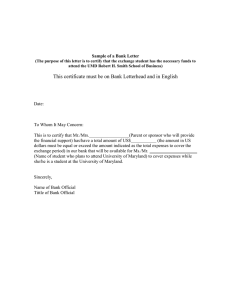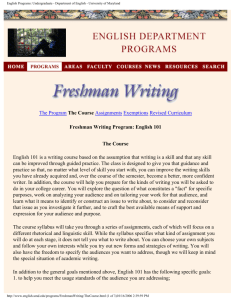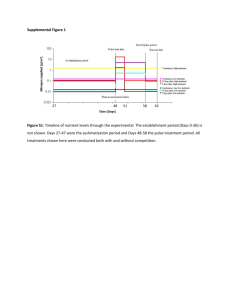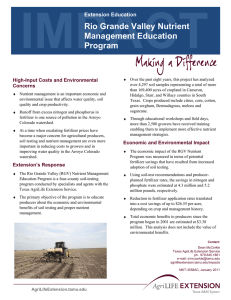Farm Notes Winter 2016 In This Issue …….. PESTICIDE APPLICATOR RECERTIFICATION
advertisement
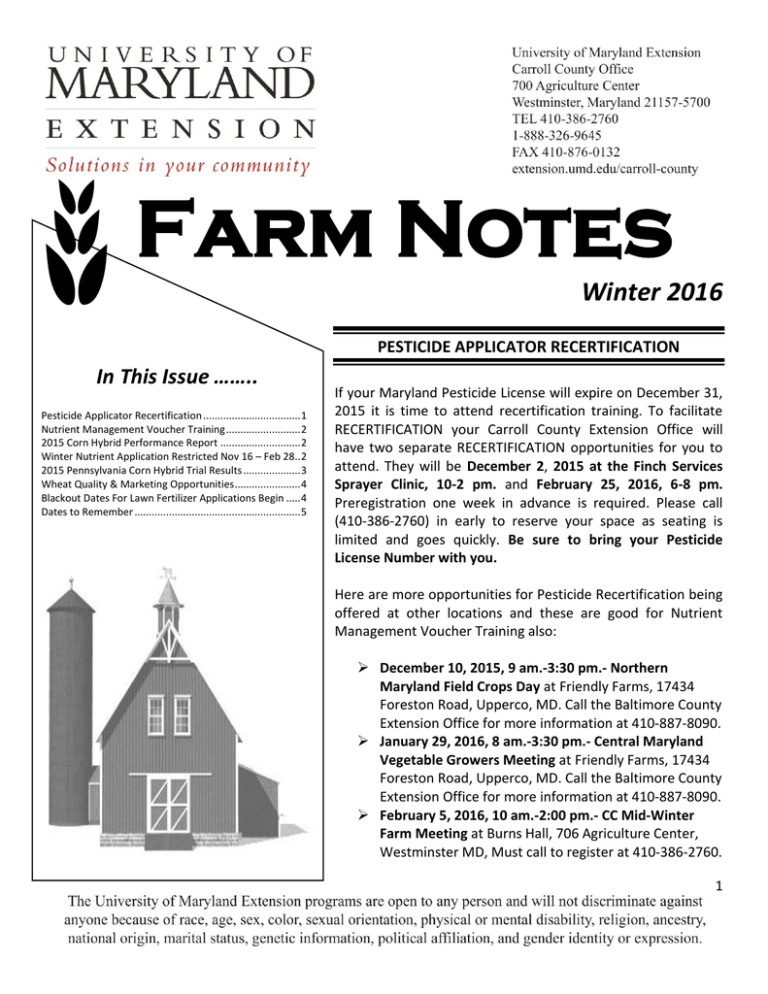
Farm Notes Winter 2016 PESTICIDE APPLICATOR RECERTIFICATION In This Issue …….. Pesticide Applicator Recertification .................................. 1 Nutrient Management Voucher Training .......................... 2 2015 Corn Hybrid Performance Report ............................ 2 Winter Nutrient Application Restricted Nov 16 – Feb 28.. 2 2015 Pennsylvania Corn Hybrid Trial Results .................... 3 Wheat Quality & Marketing Opportunities ....................... 4 Blackout Dates For Lawn Fertilizer Applications Begin ..... 4 Dates to Remember .......................................................... 5 If your Maryland Pesticide License will expire on December 31, 2015 it is time to attend recertification training. To facilitate RECERTIFICATION your Carroll County Extension Office will have two separate RECERTIFICATION opportunities for you to attend. They will be December 2, 2015 at the Finch Services Sprayer Clinic, 10-2 pm. and February 25, 2016, 6-8 pm. Preregistration one week in advance is required. Please call (410-386-2760) in early to reserve your space as seating is limited and goes quickly. Be sure to bring your Pesticide License Number with you. Here are more opportunities for Pesticide Recertification being offered at other locations and these are good for Nutrient Management Voucher Training also: December 10, 2015, 9 am.-3:30 pm.- Northern Maryland Field Crops Day at Friendly Farms, 17434 Foreston Road, Upperco, MD. Call the Baltimore County Extension Office for more information at 410-887-8090. January 29, 2016, 8 am.-3:30 pm.- Central Maryland Vegetable Growers Meeting at Friendly Farms, 17434 Foreston Road, Upperco, MD. Call the Baltimore County Extension Office for more information at 410-887-8090. February 5, 2016, 10 am.-2:00 pm.- CC Mid-Winter Farm Meeting at Burns Hall, 706 Agriculture Center, Westminster MD, Must call to register at 410-386-2760. 1 NUTRIENT MANAGEMENT VOUCHER TRAINING Every three years you need to update/renew your MDA nutrient management voucher. Sessions have been scheduled this fall to provide you the opportunity to meet MDA’s every three year requirement. Trainings are scheduled for November 24, 2015, January 7, 2016, and March 1, 2016 from 6-8 pm at the Carroll County Extension office. Please call (410-386-2760) at least one week in advance to reserve your seat. If you have any questions please call the Extension Office at 410-386-2760. If you do not have a nutrient management voucher and need one, this training will also meet that need. 2015 CORN HYBRID PERFORMANCE REPORT The 2015 Corn Hybrid Performance report has been posted to the Plant Science and Landscape Architecture Department’s MD-CROPS webpage at http://www.psla.umd.edu/extension/md-crops AGRICULTURE OFFICIALS REMIND FARMERS THAT WINTER NUTRIENT APPLICATIONS ARE RESTRICTED FROM NOVEMBER 16-FEBRUARY 28 Agriculture Secretary Joseph Bartenfelder reminds farmers that application of chemical fertilizer and organic nutrients is prohibited between November 16 and February 28 according to the State’s nutrient management regulations (COMAR 15.20.08.05). These blackout dates will change next year when Maryland’s updated nutrient management regulations phase in for this practice. MDA’s nutrient management regulations prohibit spreading of commercial fertilizer and stackable manure between November 16 and February 28; require stackable manure to be stored in a structure or stacked according to MDA’s temporary field stockpiling requirements if storage is not available; and outline specific situations in which non-stackable manure can be applied in the winter months. An individual’s nutrient management plan would reflect these conditions and farmers are urged to review their plans carefully. MDA reminds farmers that fall nitrogen applications on small grains are prohibited if a fall nitrate test indicates levels greater than 10 parts per million (PPM) for wheat or 15 ppm for barley. Moreover, cover crops must be planted when organic nutrient sources are applied to fallow ground in the fall. “Maryland farmers are leaders in protecting our state’s natural resources, especially the Chesapeake Bay” said Secretary Bartenfelder. “Nutrient management plans serve as both an important crop management tool and an environmental protection tool. I encourage farmers to read and follow their plans.” To further protect water quality, beginning July 1, 2016, all nutrient applications will be prohibited between November 2 and February 28 for farms on the Eastern Shore and between November 16 and February 28 for farms on the Western Shore. Farmers with fewer than 50 animal units have until March 1, 2020. Manure deposited directly by livestock is not restricted at any time of year. 2 Farmers or nutrient applicators with questions about winter application of fertilizers should call their nutrient management consultant or regional MDA nutrient management specialist. The headquarters phone number is 410-841-5959 and full listing is provided on line at: http://mda.maryland.gov/resource_conservation/Pages/farmer_information.aspx Source: MDA 2015 PENNSYLVANIA CORN HYBRID TRIAL RESULTS Penn State Extension and the Professional Dairy Managers of Pennsylvania have released the 2105 Pennsylvania Corn Hybrid Silage Trial Results. You can evaluate hybrids based on many factors including: yield, digestibility, crude protein, fiber content, and derived values such as milk per acre and Mill per ton. We have posted the results of our cooperative corn hybrid silage evaluation trials conducted collaboratively with the Professional Dairy Managers of Pennsylvania. Five sets of tests have been conducted across 10 locations in the state. Early, Medium and Late Maturity hybrid evaluations were conducted at three locations in northern, central and south central counties, respectively. An additional set of two trials evaluated early hybrids in south central PA. A final set of four tests evaluated BMR hybrids across south central PA. Yields this year were generally good with a few sites impacted by the late season dry weather. This caused some to have higher dry matter concentrations at harvest than we planned for, but this was fairly common with this year’s crop. When using these trials it is always best to rely on the multilocation data as the best indicator of future hybrid performance. All of the data are presented in excel spreadsheets, with hybrids segregated in early and late subgroups that they were entered in by the seed companies. Hybrids are sorted by dry matter. Avoid making comparisons for quality among hybrids that differ significantly for dry matter, as this can affect both yield and starch content. Each combined spreadsheet contains two charts that compare the yield and either the milk/ton or milk/acre. In the BMR tests, fiber digestibility was measured with wet chemistry. All other analysis were done using NIR. We have included some additional documents that provide the individual field history and the contact information for participating seed companies. Thanks are due to the collaborators who provided land for testing, seed companies, and the Professional Dairy Managers of Pennsylvania for their contributions. This is part of a broader effort to study hybrid impacts on silage quality. The link to the results is: http://extension.psu.edu/plants/crops/news/2015/11/corn-silage-evaluation-trialsposted?utm_campaign=Field+Crop+News&utm_medium=email&utm_source=newsletter&utm_content=news letter_title Source: Greg Roth, Professor of Agronomy, Penn State University 3 WHEAT QUALITY AND MARKETING OPPORTUNITIES: MAXIMIZING PROFITS Sponsored by: University of Delaware Cooperative Extension and the Maryland Crop Improvement Association. The quality of winter wheat has been threatened by diseases such as Fusarium head blight, glume blotch, and environmental issues that result in low falling numbers. This meeting will focus on wheat quality from several different perspectives in order to deliver a safe, high quality product to the buyers and end users and improve grower profitability. Local grain buyers will discuss the importance of high quality grain and opportunities for marketing wheat in our area. All wheat growers in our region should plan to attend and learn about management options for quality reducing diseases of wheat and the future outlook of the local wheat market. Light refreshments will be served. Date: Wednesday, January 13, 2016 Time: 6:00-9:00 pm Location: Harrington, DE; Delaware State Fairgrounds; Exhibit Hall Continuing Educations Credits: DE Pesticide; MD Pesticide; CCA 6:00-6:30 pm: The Agronomics Behind Wheat Quality. Jennifer Vonderwell, Cereal Grains Breeder, Syngenta 6:30-7:00 pm: Fusarium head blight and glume blotch Overview. Dr. Nathan Kleczewski, Extension Plant Pathologist, UD 7:00-7:30 pm: Sampling techniques and grain storage for minimizing grain quality issues. Dr. Carlos Campabadal. IGP Outreach Specialist, Kansas State University 7:30-7:50 pm: Buying Local Wheat-What Delaware and Maryland Growers Need to Know. John Ade, Sr. Vice President of North American Grain, Perdue Agribusiness 7:50-8:10 pm: Prospective from the Milling Industry. Justeen Koehler, Commercial Manager, ADM, Camp Hill, PA 8:10-8:30 pm: Wheat Marketing-What's in Store for the Future. Lee Sproull, Director of Grain Marketing, Mountaire Farms 8:30-9:00 pm: Roundtable Discussion: Q & A Session Bill Hostetter, Grain Merchandiser, Hostetter Grain Inc. Mark Sultenfuss, Nagel Farm Service, Inc. John Ade, Sr. Vice President of North American Grain, Perdue Agribusiness Lee Sproull, Director of Grain Marketing, Mountaire Farms Justeen Koehler, Commercial Manager, ADM BLACKOUT DATES FOR LAWN FERTILIZER APPLICATIONS BEGIN NOVEMBER 16 The Maryland Department of Agriculture reminds citizens that fertilizer blackout dates authorized by Maryland’s Lawn Fertilizer Law take effect November 16 and run through the month of February. The law prohibits citizens from fertilizing their lawns with products containing phosphorus and nitrogen during the blackout dates. Lawn care professionals may apply nitrogen to lawns that they manage until December 1, 4 using specially formulated products that reduce the risk of nutrient runoff into streams, rivers and the Chesapeake Bay. Potassium and lime may still be applied during the blackout dates since they are not considered a threat to water quality. Both citizens and lawn care professionals may resume lawn fertilizer applications containing nitrogen and phosphorus on March 1, as long as the ground is not frozen or heavy rain is not predicted. As an additional reminder, fertilizer may not be used to de-ice walkways or other impervious surfaces. “Fertilizer works best when the grass is actively growing,” said Maryland Agriculture Secretary Joe Bartenfelder. “Applying fertilizer to hard or frozen ground increases the risk for nutrient runoff into the storm drains that feed the Bay. Excess nutrients have been shown to contribute to the growth of algae blooms that block sunlight and rob the Bay of oxygen needed to sustain life. Farmers are working hard to protect the Bay from excess crop nutrients, but everyone needs to step up if we are going to make a difference for the Bay.” Maryland’s Lawn Fertilizer Law went into effect in 2013 and requires both homeowners and lawn care professionals to follow University of Maryland fertilizer recommendations and use best management practices when fertilizing lawns. In addition, the law requires lawn care professionals to be licensed and certified by the Maryland Department of Agriculture to apply fertilizer to the properties they manage. The department maintains a list of certified lawn care professionals along with additional information on Maryland’s Lawn Fertilizer Law on its website at www.mda.maryland.gov/fertilizer. Source: MDA DATES TO REMEMBER November 17 – 19 Mid-Atlantic Crop Management School-9 to 5pm, Princess Royale Hotel in Ocean City. Register at https://www.psla.umd.edu/extension/md-crops November 24 Nutrient Management Voucher Training-6 to 8 pm, Carroll County Extension Office, 700 Agriculture Center, Westminster MD, Must call to register at 410-386-2760. December 2 Private Pesticide Applicator Recertification/Finch Services Sprayer Clinic-10 to 2pm, Burns Hall, 706 Agriculture Center, Westminster MD, Must call to register at 410-3862760. December 3 Agribusiness Breakfast-To be announced-8 to 9am, Baugher’s Restaurant, Westminster MD, Must call 410-386-2760 or email mabbott@umd.edu to register. December 10 Northern MD Field Crop Day-9 to 3:30 pm, Friendly Farms, 17434 Foreston Rd, Upperco, MD, Call the Baltimore County Extension Office for more information at 410887-8090. 5 January 7 Nutrient Management Voucher Training-6 to 8 pm, Carroll County Extension Office, 700 Agriculture Center, Westminster MD, Must call to register at 410-386-2760. January 7 Agribusiness Breakfast-Curating the Collection: An Update-Stefanie Strosnider, Curator, Carroll County Farm Museum, 8 to 9am, Baugher’s Restaurant, Westminster MD, Must call 410-386-2760 or email mabbott@umd.edu to register. January 29 Central MD Vegetable Growers’ Meeting-8 to 3:30 pm, Friendly Farms, 17434 Foreston Rd, Upperco, MD, Call the Baltimore County Extension Office for more information at 410-887-8090. February 4 Agribusiness Breakfast-Out of My Hands: GPS Controlled Farm Equipment and Drone Applications for Agriculture-Ken Diller, Precision Ag Manager, Hoober, Inc., 8 to 9am, Baugher’s Restaurant, Westminster MD, Must call 410-386-2760 or email mabbott@umd.edu to register. February 5 Carroll County Mid-Winter Farm Meeting- 10 to 2pm, Burns Hall, 706 Agriculture Center, Westminster MD, Must call to register at 410-386-2760. February 25 Private Pesticide Applicator Recertification-6 to 8 pm, Carroll County Extension Office, 700 Agriculture Center, Westminster MD, Must call to register at 410-386-2760. March 1 Nutrient Management Voucher Training-6 to 8 pm, Carroll County Extension Office, 700 Agriculture Center, Westminster MD, Must call to register at 410-386-2760. March 3 Agribusiness Breakfast-Everything Eggs: Production, Marketing and the Avian Flu-Evan Fogarty, Plant Manager, Sauder’s Eggs, Hampstead, MD, 8 to 9am, Baugher’s Restaurant, Westminster MD, Must call 410-386-2760 or email mabbott@umd.edu to register. April 7 Agribusiness Breakfast-Agriculture Initiatives at the University-Dr. Craig Beyrouty, Dean of the College of Agriculture and Natural Resources, University of Maryland, 8 to 9am, Baugher’s Restaurant, Westminster MD, Must call 410-386-2760 or email mabbott@umd.edu to register. May 5 Agribusiness Breakfast-This Year’s Legislative Wrap-Up-State Senator Justin D. Ready, 8 to 9am, Baugher’s Restaurant, Westminster MD, Must call 410-386-2760 or email mabbott@umd.edu to register. June 2 Agribusiness Breakfast-Dairy and Your Diet-Ann Dicke, Faculty Extension Assistant for 4-H Youth Development, University of Maryland Extension – Carroll County, 8 to 9am, Baugher’s Restaurant, Westminster MD, Must call 410-386-2760 or email mabbott@umd.edu to register. 6 Visit our web site at http://extension.umd.edu/carroll-county For more event listings visit http://www.agnr.umd.edu/AGNRCalendar/ Yours for better farming from your Carroll County Agriculture Extension Educators, Bryan R. Butler, Sr. Extension Agent Agriculture and Food Systems bbutlers@umd.edu Steve Allgeier Extension Educator Home Horticulture Master Gardener Coordinator hortman@umd.edu If you would like to be removed from our mailing list, please call: 410-386-2760 or 1-888-326-9645. If you have a disability that requires special assistance for your participation in a program please contact the Carroll County Extension Office at 410-386-2760, Fax: 410-876-0132, two weeks prior to the program. The information given herein is supplied with the understanding that no discrimination is intended and no endorsement by University of Maryland Extension is implied. 7
